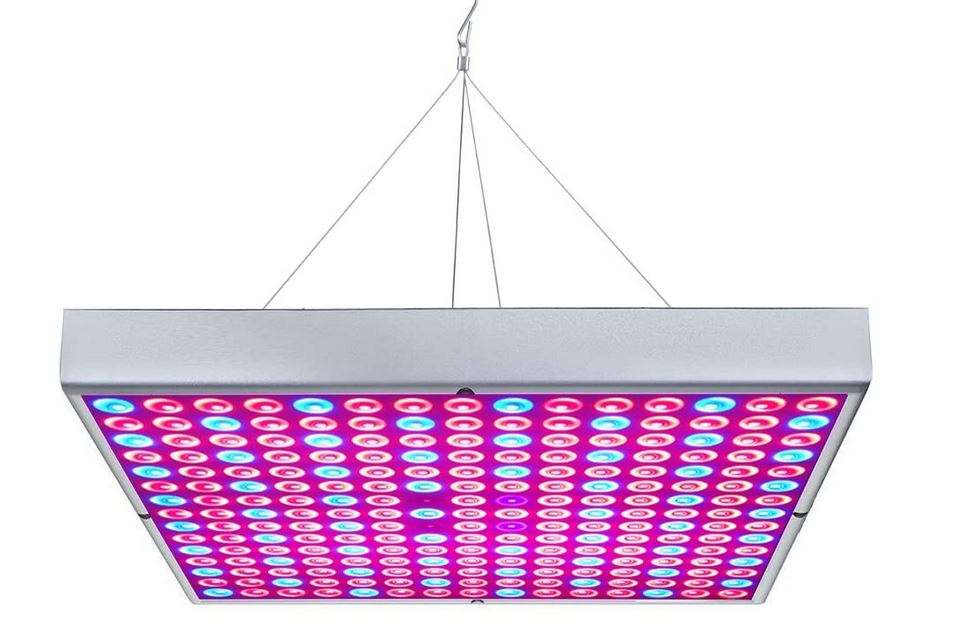Best LED Lights for Hydroponics and Why They Rock!
by Kevin
Can the best LED compete with HIDs? High Intensity Discharge lamps are the talk of the town, but do they have an alternative in hydroponic led lights? Find the answer to this question in the following article.
The Best Hydroponic Led Lights - An Alternative to HIDs?

Maybe I didn't choose the title the way I should have and added a question mark at the end, because this is more of a question than a fact: are hydroponic led lights a viable alternative to HID (High Intensity Discharge) lamps?
Opinions in the hydroponic gardening community are varied, so I'm not going to jump into any conclusions. I'll just present the pros and cons of hydroponic led lights in comparison to High Density Discharge ones and you'll have to decide for yourself which ones are best.
And if you're also thinking about fluorescent lights, I've written an article on fluorescent lights vs high intensity discharge (HID) lamps.
I recommend you buy your lamps from a trusted hydroponics store that offers a large variety of lightning products, cheap to expensive.
The Advantages of Hydroponic LED Lights
Probably one of the biggest problems with even the best HIDs is that they use high pressures to produce light and this pressure can often be the cause of serious accidents.
HIDs work at heats exceeding 1800F degrees and they're quite vulnerable to humidity. This combination can cause the HID bulbs to burst, sending fragments of the bulb at incredible speeds all over the place, just like a military grenade.
Led lights are a lot more relaxed. Sure, hydroponic led lights don't particularly love humidity or harsh working environments, but it won't react as badly as HIDs when the stress gets too much. Leds 1, HIDs 0.
Unlike HIDs, which require a lot of power to produce the kind of light intensity they're famous for, hydroponics led lights are very efficient in terms of power and cost alike.
You can place your growing lights on a timer so that only the absolute required electricity is used, but even then, LEDs are cheaper to run.
Not only will you be able to save up some money by having a less power hungry light do all the work, but you'll also avoid auxiliary costs that HID hydroponics lights usually involve, such as ballasts that often break down and need to be changed.
Last but not least, hydroponic led lights are environmentally friendly, since they don't use the toxic materials (such as mercury for example) that most HIDs use. And with today's environmental craze, it's no surprise that hydroponics led lights are gaining more and more ground.
Disadvantages of Hydroponic LED Lights
As you probably know, most plants require two colors from the light spectrum, red and blue, to grow and function properly and a lot of hydroponic led lights come with one red and one blue led, in order to fully cover a plant's needs.
This is actually wrongfully seen as an advantage over HIDs, with hydroponic led lights enthusiasts saying that by offering a wider spectrum of light colors, HIDs actually waste light. There isn't such thing as wasted light and even if a particular color temperature doesn't do much for a plant, it perfectly simulates the natural growing habitat, which receives all color temperatures, not just red and blue.
Besides, some plants are well known for using mid-spectrum colors, such as green in their growth process, which would make a led light insufficient in these particular scenarios.
Another minus next to hydroponic led lights in comparison to HIDs is the lack of the element that makes HIDs so powerful: intense point light.
Point lights are more focused, thus they are able to penetrate a plant's leaves faster and better, allowing it to make more of the light it gets. Hydroponic leds are at a slight disadvantage here.
So are hydroponic led lights a viable alternative to high intensity discharge lamps? Well, if power and long-run costs are an issue for you, leds are definitely a good choice.
But if you think you could work safely with a HID and the power consumption is not really a problem, leds can easily be skipped. Ultimately, it's your call and your call alone.
Thoughts on "Best LED Lights for Hydroponics and Why They Rock!"
 |
 |
 |
 |
Hydroponics Tips